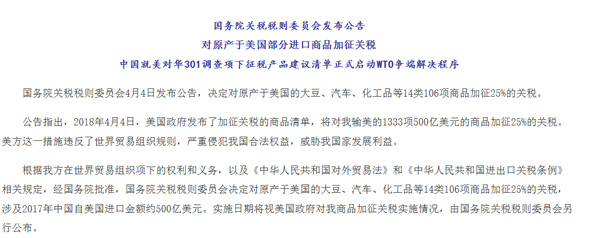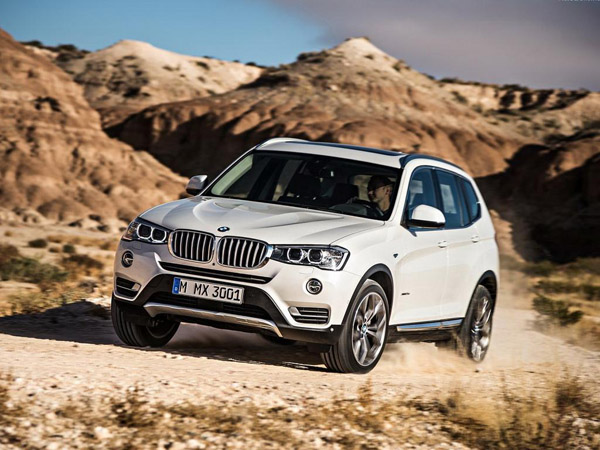This trade war initiated by the United States against China has caused the Sino-U.S. auto manufacturing industry, which is among them, to become the focus of attention of all parties.
On April 4, after the United States government issued a list of goods subject to tariffs, China also “attacked†and decided to impose a 25% tariff on 14 categories of 106 products such as soybeans, automobiles, and chemical products originating in the United States. According to the current announcement, the specific time for the implementation of the tax increase policy will be announced separately according to the implementation of the US Government’s tariff increase on China’s goods.

According to relevant regulations, in the United States, it produces a fuel-powered sedan/SUV with a displacement of more than 1.5L, an MPV with less than 9 seats, a plug-in sedan/SUV with a displacement of more than 1.0L, an MPV with less than 9 seats, a pure electric vehicle, and less than 5 tons. The auto parts such as gasoline trucks and gearboxes and other models are all subject to tariff increases this time.
This means that once the policy is in place, the mainstream US imported models currently sold in China are almost “without being sparedâ€, and there will be different levels of price increases, so a 2.0T yuan with a declaration price of 300,000 yuan. (Assuming that the engine displacement is 1997ml), for example, the total cost before the tariff increase is about 461,850,000 yuan. After adding 25% tariff, the cost will rise to about 554,210,000 yuan.
From the perspective of policy, the U.S.-based cars represented by Ford and GM are undoubtedly the most direct stakeholders, and the degree of localization has caused the two U.S. car companies to “strangeâ€: among them, GM has basically achieved most models. Localization, such as Cadillac's sales of imported cars in China last year, was only Carried, CTS, etc. Last year, sales of only 415 vehicles, so the impact is not great; but Ford's luxury car brand Lin Quan models: Continental, MKC, MKX, MKZ, and pilots are all imported cars, and in 2017 Lincoln sold more than 54,000 vehicles.
In addition, Tesla, the US electric car company, is also affected. In 2017, Tesla sold 17,000 vehicles in China, accounting for 16.5% of its global sales. In the January-February period, the cumulative sales volume was 2380 vehicles.

It is worth noting that the object of taxation is not American brand cars, but cars produced in the United States. Therefore, the most "injured" trade war between China and the United States is probably the German luxury brand: BMW and Mercedes-Benz.
Currently, BMW is the largest automotive export brand in the United States. The brand has its largest plant in the world in Spartanburg, USA. According to Evercore ISI, the U.S. investment bank, the tariff involved in this factory is 965 million U.S. dollars.
It is reported that the Baomas Passanborg plant is mainly responsible for the production of X4, X5, X6 and X7 sport utility vehicles (SUVs). According to information from a BMW insider who declined to be named, China’s tariff increase on imported cars in the United States will force BMW to shift its sales of hot models like the X5.
But there is no doubt that any factory relocation needs to cost millions of euros, take months of resettlement and long-term inspections. BMW’s board member Peter Schwarzenbauer told Reuters last month that “Whether it is a factory in Spartanburg or a factory in Mexico, BMW’s plan covers the next 20 to 30 years if this period There is a policy change and BMW will change the plan. This will drive us crazy."
Daimler also has a factory in Vance, Alabama. According to the US investment bank Evercore ISI, the factory will face a loss of US$765 million.
According to Evercore ISI, this year, BMW and Daimler will sell 100,000 cars from the United States to the Chinese market, including about 64,000 BMW SUV models and 51,000 Daimler models, including Mercedes-Benz GLE and GLS. And R-class cars - the total value of goods reached about 7 billion US dollars.
Regarding the current impact of the policy, BMW (China) said in an interview with the Yu Xin reporter that “the taxation list has just been announced and the implementation date will be determined. We already know the decision of the Chinese government and will pay close attention to further development. At present, we are evaluating the potential Impact, no further comment."
The Mercedes-Benz side also said: "The relevant negotiations are still in progress, please understand that we do not make speculation. We will closely monitor the progress."
SLS-Selective Laser Sintering technology, using 3D Printing materials: PA Series Nylon 3D Printing Material: Abrasion Resistance, High Strength and Stiffness, Good Chemical Resistance, Excellent Long-term Invariant Behavior, High Selectivity and Detailed Analysis, Biocompatibility in accordance with EN ISO 10993-1 and USP, and in accordance with EU Plastics Directive approved for food contact. Typical applications of this material are the highest quality of fully functional Plastic Parts. But the surface is relatively rough. There are also PA3200GF nylon fiberglass materials for deep drawing dies or any other applications requiring specific stiffness, high thermal deformation temperature and low wear; typically used in aluminium-filled nylon materials for metallic appearance and thermal load parts. At present, desktop LS laser sintering PA12 nylon powder material is also an option.
Selective Laser Sintering
Selective Laser Sintering,3D Printing Pa Material,Auto Door Accessories Parts,Selective Laser Sintering Prototype
Ningbo Expert Mould Plastic Co., Ltd. , https://www.prototypesmaker.com
![<?echo $_SERVER['SERVER_NAME'];?>](/template/twentyseventeen/skin/images/header.jpg)